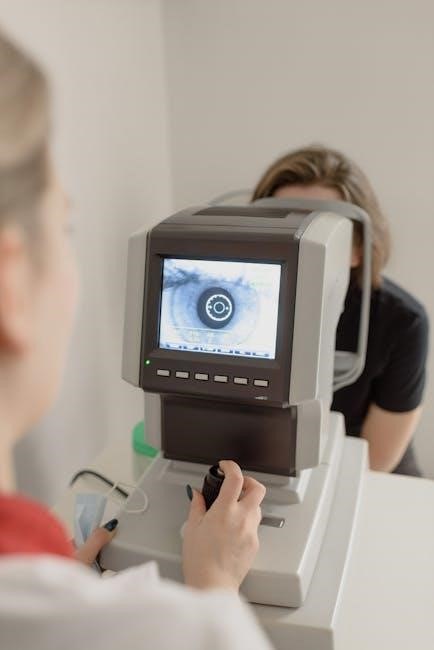The medical terminology final exam is a comprehensive assessment of knowledge, covering various aspects of medical terminology, with 200 questions in pdf format, designed to evaluate understanding and application of terms.
Overview of Medical Terminology
Medical terminology is a language used to describe the human body and its functions, as well as diseases and treatments. It is a complex system of words and phrases that are used to communicate effectively in healthcare settings. The terminology is based on a combination of Latin, Greek, and English roots, prefixes, and suffixes. Understanding medical terminology is essential for healthcare professionals, including doctors, nurses, and medical administrators. A strong foundation in medical terminology is critical for accurate diagnosis, treatment, and patient care. The medical terminology final exam 200 questions pdf is a valuable resource for students and professionals seeking to assess their knowledge and understanding of medical terminology. The exam covers a wide range of topics, including anatomy, physiology, and pharmacology, and is designed to evaluate the ability to apply medical terminology in real-world scenarios. Effective communication in healthcare relies heavily on the use of accurate and precise medical terminology.
Understanding Medical Terminology Concepts
Concepts are understood through roots and prefixes in medical terminology, enabling accurate interpretation of terms.
Root Words and Prefixes
Root words and prefixes are fundamental components of medical terminology, providing the foundation for understanding complex terms. The root word, also known as the stem, carries the core meaning of the term, while prefixes modify or enhance the meaning. For example, the root word “card” refers to the heart, and the prefix “hyper” means excessive or above normal. Combining these elements forms the term “hypertension,” which refers to high blood pressure. In the context of the medical terminology final exam, understanding root words and prefixes is crucial for accurately interpreting and defining medical terms. The exam may include questions that require the application of root words and prefixes to form new terms or to define unfamiliar words. By mastering these components, individuals can improve their overall comprehension of medical terminology and perform well on the exam. Effective learning strategies include breaking down complex terms into their root words and prefixes.

Medical Terminology Final Exam Questions
The exam includes 200 questions in pdf format, assessing knowledge of medical terms and concepts, with answers provided for self-assessment and review purposes, covering various topics and subtopics in detail accurately.
Sample Questions and Answers
The medical terminology final exam 200 questions pdf includes a variety of sample questions and answers to help students prepare for the exam. These questions cover different topics such as root words, prefixes, and suffixes, as well as medical terms related to various body systems. The answers are provided in a clear and concise manner, allowing students to understand the correct terminology and its application. The sample questions and answers are designed to simulate the actual exam experience, helping students to assess their knowledge and identify areas where they need to focus their studies. By reviewing the sample questions and answers, students can gain a better understanding of the exam format and content, and develop a strategy to tackle the questions effectively. The sample questions and answers are an essential resource for students preparing for the medical terminology final exam, providing them with a comprehensive overview of the exam content and helping them to achieve a high score.

Preparing for the Medical Terminology Final Exam
Students can prepare using study guides and online resources to review medical terminology concepts and practice with sample questions.
Study Tips and Strategies
To prepare for the medical terminology final exam, students can use various study tips and strategies, such as creating flashcards to review key terms and concepts, making concept maps to visualize relationships between terms, and practicing with sample questions and quizzes.
Using online resources, such as practice exams and study guides, can also be helpful in reviewing and reinforcing knowledge of medical terminology.
Additionally, students can form study groups to collaborate and review material with their peers, and use mnemonic devices to help remember complex terms and concepts.
By using these study tips and strategies, students can feel more confident and prepared for the medical terminology final exam, and can improve their chances of achieving a high score on the exam.
Effective time management is also crucial, as students should allocate sufficient time to review and practice all the material, and avoid cramming all the studying into one night.
Overall, a combination of these study tips and strategies can help students achieve success on the medical terminology final exam.

Medical Terminology Final Exam Format
The exam format includes multiple-choice questions and short answers, assessing knowledge of medical terms and concepts, with a total of 200 questions in a pdf document for evaluation purposes only.
Question Types and Formats
The medical terminology final exam features a variety of question types, including multiple-choice, true or false, and short answer questions, all designed to assess knowledge of medical terms and concepts. The exam is typically administered in a pdf format, containing 200 questions that cover a wide range of topics. The multiple-choice questions require students to select the correct answer from a list of options, while the true or false questions require students to identify whether a statement is correct or incorrect. The short answer questions require students to provide a brief answer to a question, often requiring the use of specific medical terminology. The exam may also include fill-in-the-blank questions, where students must fill in the correct term or concept. Overall, the question types and formats are designed to provide a comprehensive assessment of a student’s knowledge of medical terminology. The exam is an important evaluation tool, used to determine a student’s understanding of medical terms and concepts.

Importance of Medical Terminology in Healthcare
Medical terminology is crucial for effective communication in healthcare, ensuring accurate diagnoses and treatments, with standardized language used universally.
Effective Communication in Healthcare
Effective communication in healthcare is vital for providing high-quality patient care, and medical terminology plays a significant role in this process. The use of standardized language ensures that healthcare professionals can accurately convey information to each other, reducing errors and improving patient outcomes. With a comprehensive understanding of medical terminology, healthcare professionals can communicate complex information clearly and efficiently, facilitating better decision-making and care coordination. In addition, effective communication in healthcare also involves being able to interpret and understand medical terminology, which is critical for diagnosing and treating patients. By using a standardized language, healthcare professionals can ensure that they are using the correct terms and definitions, reducing confusion and miscommunication. This is particularly important in high-stakes situations, such as emergency care or surgical procedures, where clear and accurate communication is essential for patient safety. Furthermore, effective communication in healthcare also extends to patient education and counseling, where healthcare professionals must be able to explain complex medical concepts in a clear and concise manner. Overall, the use of medical terminology is essential for effective communication in healthcare, and is a critical component of providing high-quality patient care.